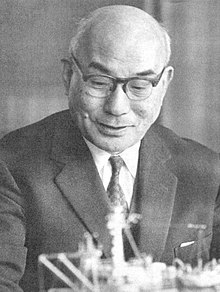Toshiwo Doko

Toshiwo Doko (土光 敏夫 Dokō Toshio, September 15, 1896 - August 4, 1988) was a Japanese engineer born in Mitsu District, Okayama, Manager, President and Chairman of Ishikawajima Heavy Industry (IHI) and Toshiba.[1][2]
Dokō was a key manager in the Japanese economic miracle after World War II, in particular, between 1974 and 1980 when he helmed the Toshiba Corporation and was appointed chairman of the Japan Business Federation (Keidanren).
After graduating from Tokyo Institute of Technology (called Tokyo Kogyo Daigaku ) in 1920, Dokō worked at the Ishikawajima Shipyard Co., first as a designer of turbines and then became a president between 1950 and 1960, during which he renewed the company to benefit from significant procurement provided by the United States during the Korean War. He studied abroad in Switzerland in 1923.
Dokō later chaired the Ishikawajima-Harima Heavy Industries Co. Ltd. during the merger in 1960, overseeing the construction of the , the largest tanker in the world. At Toshiba, he functioned as a vice president between 1965 and 1972, and became the president between 1972 and 1976. He raised the morale of the workers driving the company towards prosperity.[3] During 1970's, he had a relationship with a company such as Standard Oil.
When belonging to IHI, he had never been late and absent from the company for 40 years, continuously. Surprisingly, his breakfast had been very simple, and consisted of a piece of fish, rice and miso soup. Even though he became the top position of IHI and very rich, his lifestyle and breakfast had not changed at all. Despite the simple breakfast, his hardworking attitude was not changed even when he turned to 85 year old. In addition, he rarely used air-conditioner during Winter and Summer, and he donated more than half of his salary, during 1970's, for the school that his mother had established in Yokohama. No one can criticize his behavior for this emerging global warming.
In 1988, he posthumously received the highest distinction of the Scout Association of Japan, the Golden Pheasant Award.[4]
References[]
- ^ http://www.britannica.com
- ^ Layne, Nathan; Ando, Ritsuko (Aug 24, 2015). "In Toshiba scandal, the 'tough as nails' target setter". Reuters. Retrieved 25 December 2016.
- ^ https://www.freebase.com
- ^ reinanzaka-sc.o.oo7.jp/kiroku/documents/20140523-3-kiji-list.pdf
- 1896 births
- 1988 deaths
- People from Okayama
- 20th-century Japanese engineers
- Toshiba people
- Tokyo Institute of Technology alumni
- Japanese scientist stubs
- Asian engineer stubs